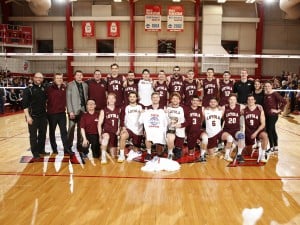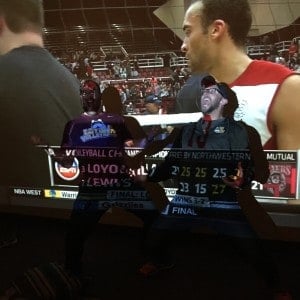
photo courtesy Steve Woltmann – Loyola Athletics
The match went to a decisive 5th set. The team was playing in California and I stayed home surrounded by brother Jesuits and other close friends. We watched the action unfold on a massive projection screen, the ball often appearing as large as my head. My hesitant, bated breath threatened to cut off effective blood flow to my hungry brain. A blackout might have been more comfortable than seeing this thing to the end.
A friend would tell me days later that as the 5th went to extra points, he couldn’t stay on his feet. Sitting heavily in a bar stool, half a pint in hand, he prayed the Hail Mary. It should have been over at 15 points. Really, it should have been over in the 4th set. At somewhere around 19-19 I burrowed into my own chair, eyes closed and fingers crossed; half-pints and Hail Marys wouldn’t keep me out of the dark pit of an impending loss.
***
I walked into the conference room sometime last September and found myself surrounded by giants. One guy was 6’11”. Two others were 6’10”. Incrementally, it went down from there such that two, perhaps three athletes on the team could look me in the eyes without burying their chins in their chests. I had no idea what I was doing or why I was there. I felt small, scared, and full of doubt.
It was partly a man-thing, my own feelings of worthlessness rising as dozens of eyes sized me up, reminding me that they were younger, in the physical prime of their lives, defending national champions with big-ass rings; I was a 32-year-old philosophy graduate student, a Jesuit with a busted vow ring.
It was partly an experience-thing—I didn’t know the sport. That line running cross court 10’ away from the net meant nothing to me. I had no idea what a pin-hitter was. I couldn’t pronounce or spell ‘libero.’ A few seasons of sloppy bar-league play in Omaha doesn’t teach a person much about the action and strategy of competitive collegiate volleyball.
It was partly a replacement-thing—I was the replacement chaplain, a second-choice replacement at that, shuffling nervously in on the heels of a man who focused them, who loved them, who cheered for them, and who walked with them to victory last season. I can’t tell you how many times (albeit playfully) I heard that if they didn’t repeat as national champions, I would be to blame. In those moments, I wondered—who replaced Oscar Romero? Who was the first pope not to be canonized? Who was the 17th President of the United States? Will I be un-remembered in the same way? We all, I think, want to be remembered. Somehow.
In any case, I said the right things: I’m here to support you, care for you, help form you into better men. If that’s what you want. Call anytime before 11 PM. After that, I don’t want to know what you’re doing, at least not in that moment. Oh, and by the way, I’m not the last guy. I’m a different guy. So, let’s reinvent this chaplaincy thing together. Let’s end with a prayer. ‘Lord, teach me to be generous…’
***
And then, it’s May. The guys are playing in the conference tournament championship. We’re on the home court of their arch-rivals, the only team to beat them all season. And, they beat our guys twice. We have a nice meal at Chili’s (which gives me stomach problems) and as the game draws near I don’t feel well. I’m fairly sure it’s more than the Chili’s, though. I don’t feel quite right about being their chaplain. My friend, the women’s team chaplain, is there too. It helps having supportive company to wax about the benefits of chaplaincy, but still I wonder: “What exactly have I done here?”
After weekly meditations and workouts, plenty of free lunches at the Jesuit residence, a retreat, hours of praying for these guys on my own time, and dancing on court during many, many timeouts, I don’t know why I did it. It’s not that they’ve been cold; quite the contrary—these are good men, and they’ve welcomed me on to their team far more than I’ve allowed myself to feel a part of it.

Celebrating victory | photo courtesy of author
Ten minutes before the game begins, I’m invited to join the team in the locker room, a tiny cinderblock square made comically tinier by their gigantic proportions. I had never joined them in the pre-game locker room before. After a brief pep talk from one of the captains, the setter calls their attention, crosses himself, and begins to recite the prayer for generosity. For three years, the old chaplain and I have ended each post-practice meditation with this prayer, but I didn’t know they prayed it before each game. They all join in. I assumed that when I recited to them those dozens of times before, they were either asleep from the relaxation of meditation or off in some distant recess of their collective college mind. But in that locker room, as I speak the familiar words with them, it appears they’ve been listening after all. They are far more generous than I gave them credit for. They are faithful men. They care for me and for what we’ve done as companions. They’ve been praying all along and I, after worrying for so long about what I could offer, finally received the gift of their prayer.
From that moment, I figured they’d be ok, and I’d be ok too. We won that night, and in the 5th set a week later, (incredibly, playing our conference rivals again) we took the whole thing. 23-21. NCAA national champions. It was a moment to remember. Before the game, I made sure to go up to the chapel in our Jesuit community and pray: “Lord, teach me to be generous…” From there, what would be would be.